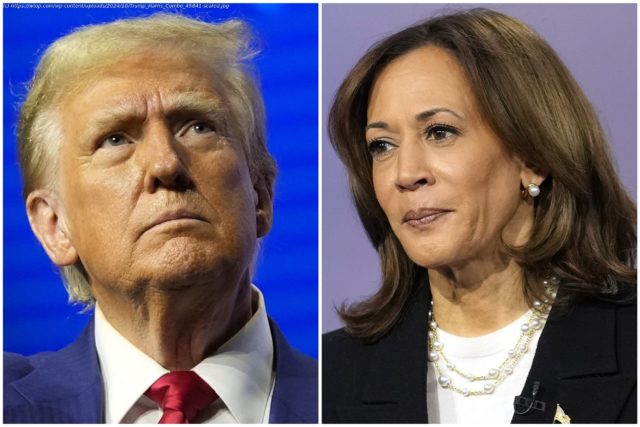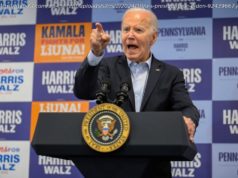WASHINGTON (AP) — Voters in this year’s presidential election are choosing between two conflicting visions of the United States offered by Democrat Kamala…
Voters in this year’s presidential election are choosing between two conflicting visions of the United States offered by Democrat Kamala Harris and Republican Donald Trump. The outcome will affect how the country sees itself and how it’s viewed across the world, with repercussions that could echo for decades.
Since replacing President Joe Biden as the Democratic nominee, Harris has pledged to blaze her own path forward. But many of the vice president’s ideas are well trod by Biden: middle-class tax cuts, tax increases on the wealthy and corporations, a restoration of abortion rights, a government that aggressively addresses climate change. and a commitment to uphold democratic values and the rule of law.
Trump has pledged retaliation against rivals as he pushes to fulfill an agenda sidetracked during his previous term by the global pandemic. The former president wants to undertake a mass deportation of migrants who are living in the United States illegally, extend and expand his 2017 tax cuts, greatly increase tariffs and offer more support for fossil fuels and less support for renewable energy. He has attacked transgender rights and pledged to end Russia’s war with Ukraine while suggesting Ukraine must make territorial concessions. He also is seeking to concentrate more government power within the White House.
The candidates have spelled out their ideas in speeches, advertisements and other venues. Both say that their approach would do more to lift up workers, the middle class and the promises that have defined America. While Trump and Harris agree on not taxing workers’ tips, the similarities largely stop there — a further sign of how the election’s outcome could reshape the country.
A look at where each candidate stands on 10 top issues:
HARRIS: She has called on Congress to pass legislation guaranteeing abortion access in federal law, a right that stood for nearly 50 years before being overturned by the Supreme Court in 2022. She has campaigned on how the patchwork of state laws limiting abortion have hurt women’s access to medical care, in one prominent case leading to the death in Georgia of Amber Nicole Thurman.
Harris has promoted the administration’s efforts short of federal law, including steps to protect women who travel to access the procedure and limit how law enforcement collects medical records. Her argument to the public is rooted in the concept of freedom, saying “the freedom to make decisions about one’s own body should not be made by the government.”
TRUMP: He often brags about nominating the Supreme Court justices who overturned Roe v. Wade. After dodging questions about when in pregnancy he believed abortion should be restricted, Trump announced last spring that decisions on access and cutoffs should be left to the states. He has praised the patchwork of restrictions that have emerged across Republican-led states, saying the people are deciding.
He has said he would not sign a national abortion ban into law and would not try to block access to abortion medication, after initially waffling. He told Time magazine that it should also be left up to states to determine whether to prosecute women for abortions or to monitor their pregnancies, but he has not rejected the idea outright. He has said that, if he wins, he wants to make in vitro fertilization treatment free for women. He has even claimed that he is the “father” of the treatment, first used in 1978, even though it has only come under threat because of the overturning of Roe v. Wade.
HARRIS: She has done something of an about-face, saying in her campaign that it’s possible to continue hydraulic fracturing for fossil fuels even as she embraces policies that favor renewable energy resources. Republicans are quick to point out that Harris opposed offshore drilling and fracking during her short-lived campaign for the 2020 presidential nomination.
As a senator from California, Harris was an early sponsor of the Green New Deal, a sweeping series of proposals meant to swiftly move the U.S. to fully green energy. It was a plan championed by the Democratic Party’s most progressive wing. But during her tenure as vice president, Harris has adopted more moderate positions, focusing on implementing the climate provisions of the Biden administration’s Inflation Reduction Act. That provided nearly $375 billion for things such as financial incentives for electric cars and clean energy projects.
The Biden administration has also enlisted more than 20,000 young people in a national Climate Corps, a Peace Corps-like program to promote conservation through projects such as weatherizing homes and repairing wetlands. Despite that, it’s unlikely that the U.S. will be on track to meet Biden’s goal of cutting greenhouse gas emissions in half by 2030.
TRUMP: His mantra for one of his top policy priorities: “DRILL, BABY, DRILL.” Trump, who in the past said climate change was a “hoax” and harbors a particular disdain for wind power, says it’s his goal for the U.S. to have the cheapest energy and electricity in the world. He has claimed he will cut prices in half within a year of his potential return to office. While he often criticizes the Biden administration for its policies, domestic oil production has already been at near-record highs since late 2023, according to the Energy Information Administration.
Trump wants to push that higher by increasing oil drilling on public lands, offering tax breaks to oil, gas and coal producers, speeding the approval of natural gas pipelines, opening dozens of new power plants, including nuclear facilities, and rolling back the Biden administration’s aggressive efforts to get people to switch to electric cars, which he argues have a place but shouldn’t be forced on consumers. He has also pledged to re-exit the Paris climate agreement, end wind subsidies and eliminate regulations imposed and proposed by the Biden administration targeting energy-inefficient kinds of lightbulbs, stoves, dishwashers and shower heads.
HARRIS: Like Biden, Harris has decried Trump as a threat to the nation’s democracy. She has agreed with former Trump administration officials who labeled him a “fascist.”
Harris has leaned more heavily into her personal background as a prosecutor and contrasted that with Trump being found guilty of 34 felony counts in a New York hush money case and being found liable for fraudulent business practices and sexual abuse in civil court. Harris initially talked less frequently than Biden did about Trump’s denial of his 2020 loss and his incitement of the Jan. 6, 2021, assault on the Capitol. But in the closing weeks of the 2024 campaign, she increasingly has framed the prospect of another Trump term as “dangerous.”
TRUMP: After refusing to accept that Biden won, Trump hasn’t committed to accepting the 2024 results.
Start
United States
USA — mix Harris and Trump offer worlds-apart contrasts on top issues in presidential race






